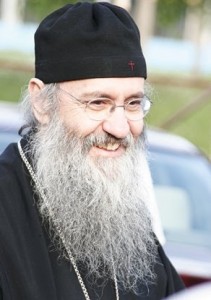by Metropolitan Hierotheos Vlachos
 Regarding the meaning of the Parable of the Prodigal Son, St. Gregory Palamas interprets the parable hesychastically. St. Luke the Evangelist presents Christ’s parable, in which we read:
Regarding the meaning of the Parable of the Prodigal Son, St. Gregory Palamas interprets the parable hesychastically. St. Luke the Evangelist presents Christ’s parable, in which we read:
Not long after that, the younger son got together all he had, set off for a distant country and there squandered his wealth in wild living. (Lk. 15,13).
St. Gregory does not analyze the parable in terms of morals, but theologically. He sets forth its true dimensions. Having the mind of Christ, experiencing the mystery of the spirit, he grasps its true meaning. Belonging organically, as he does, to the Orthodox Tradition, he realizes that the Fall of man, the so-called Ancestral Sin, is in reality a darkening, obscuring and deadening of the nous, whereas the resurrection of man is the vitalization of the dead nous. It is in this light that he also interprets the Parable of the Prodigal Son.
The nous is man’s real wealth.
“Above all else the nous is our innate essence and wealth”.
As long as we remain on the ways of salvation
“we have our nous gathered in itself and in the first and highest nous, God”.
Our salvation is that we have our nous in God. But when we open a door to the passions, then our nous
“is immediately scattered, wandering all the time around things that are carnal and worldly, around the manifold pleasures and passionate thoughts about them”.
Then a man’s nous becomes prodigal, and in general he is called prodigal. The wealth of the nous is prudence, and it distinguishes good from evil as long as we continue to keep Christ’s commandments. But when the nous withdraws from God, then prudence too is scattered into prostitution and imprudence.
Man’s soul has not only a rational aspect but also appetitive and incensive aspects. In its natural condition man’s nous
“directs desire towards the one and truly existing God, the only Good One, the only Judge, the only one who provides pleasure unmixed with any pain.”
But when the nous is in the unnatural state, when it departs from God and is darkened, then desire is dispersed into many self-indulgent appetites:
“Drawn on the one hand towards a desire for foods that are not needed, secondly towards the desire for unnecessary things, and thirdly towards the desire for vain and inglorious glory”.
This comes about through desire. But when the nous is being deadened, the incensive power too is similarly taken captive. When the nous is in its natural state, when, that is to say, it is united with God, then it rouses the incensive power only against the devil and utilises the soul’s courage against the devil and the passions. But when it disregards the divine commandments, then
“one fights against one’s neighbour, rages against those of the same race, is infuriated with those who do not assent to one’s irrational appetites, and alas, one becomes a homicidal man…”.
